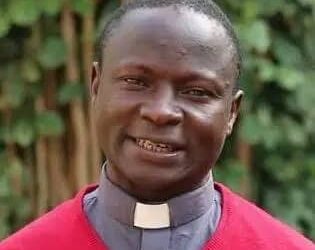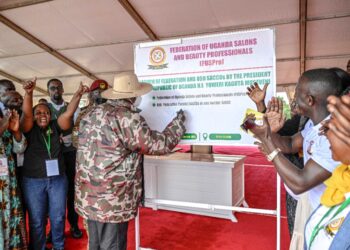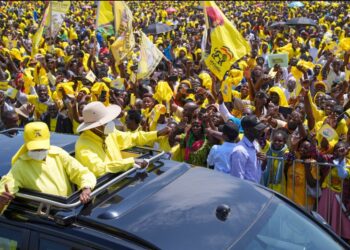The protest movement in Sudan won a new victory on Friday night when the military moved to replace the country’s controversial transitional leader after a single day, following street rallies against him.
Thousands of jubilant protesters celebrated in the streets after the defence minister, Ahmed Awad Ibn Auf, who was named de facto leader after overthrowing Omar al-Bashir on Thursday, announced he was stepping down as transitional leader. He named another, less controversial army general as his successor at the head of a military-led council.
This may not be enough to satisfy pro-democracy campaigners who have called for civilian government and widespread reforms but is being taken as a positive sign that statements by their new rulers indicating they wanted a “dialogue” with protesters were sincere.
The council also announced it would not extradite Bashir to face allegations of genocide at the international criminal court. Instead, he could go on trial in Sudan.
Protests in Sudan erupted on 19 December in the eastern city of Atbara after a government decision to triple the price of bread, but quickly evolved into nationwide demonstrations against Bashir’s rule. The situation escalated dramatically a week ago, when thousands of demonstrators began a sit-in outside the defence ministry compound in central Khartoum. Five days later the army stepped in to remove Bashir, who had been in power since 1989.
Auf said he would be replaced by General Abdel-Fattah Burhan, general inspector of the armed forces, as head of the transitional council, which has said it will rule the country for two years until elections.
“I am confident he will steer the ship to safe shores,” he said of Burhan, adding that he was stepping aside to “preserve unity” of the armed forces.
Organisations leading the protesters have said the demonstrations will continue and thousands remained at their makeshift encampment in central Khartoum overnight from Friday to Saturday in defiance of an overnight curfew imposed by the military.
An association of Sudanese doctors said 26 people had died and more than 150 had been injured – 15 critically – since the sit-in began. Five of the dead were soldiers who were killed protecting the demonstrators during attacks by pro-Bashir militia.
Police officials said at least 16 people had been killed and 20 injured by stray bullets at protests and sit-ins on Thursday and Friday.
There were reports of exchanges of gunfire near the sit-in site, possibly between members of militia or the feared intelligence service and the army.
Protestors at the site chanted “We won’t leave until the National Intelligence and Security Service is gone”.
Ibn Auf was a controversial figure, blacklisted by Washington for his role as the army’s head of military intelligence and security during the Darfur conflict. He has been defence minister since 2015 and was promoted in February by Bashir to the role of first vice-president.
The US imposed sanctions on him in 2007 for arming and directing pro-government militias in Darfur known as the Janjaweed, accused of widespread atrocities against civilians and rapes during the conflict.
His appointment was seen by protestors as evidence that there had been no real change following Bashir’s fall.
Burhan’s record appears to be cleaner than the rest of Bashir’s generals and he is not known to be implicated in war crimes or wanted by international courts. He was one of the generals who went to meet protesters at the encampment near the military headquarters and listened to their views.
Chants rang out across the sit-in where tens of thousands have been rallying in front of the military headquarters to protest against the military takeover of power after Bashir’s removal. “Revolutionaries, we will continue our path,” the protesters shouted as they danced and clapped.
Earlier another senior officer, Omar Zein Abedeen had told reporters during a televised press conference said that Bashir, 75, would not be extradited to the International Criminal Court, based in The Hague, Netherlands as doing so would be “an ugly mark on Sudan.”
Zein Abedeen said Sudanese courts would hold Bashir “accountable,” but did not specify what charges he could face. After his arrest, the military denounced the former leader and his government for corruption, maladministration and “lack of justice.”
The move underscores the limits on the reach of the International Criminal Court. On Friday, ICC judges rejected a request by the court’s prosecutor to open an investigation into war crimes and crimes against humanity in Afghanistan and alleged crimes by US forces there, in part because the US, Afghan government and Taliban are not expected to cooperate.
Bashir was one of Africa’s longest-serving leaders. His long rule has left Sudan’s economy in a dire state, with shortages of cash, soaring inflation and very high levels of unemployment.
Do you have a story in your community or an opinion to share with us: Email us at editorial@watchdoguganda.com












